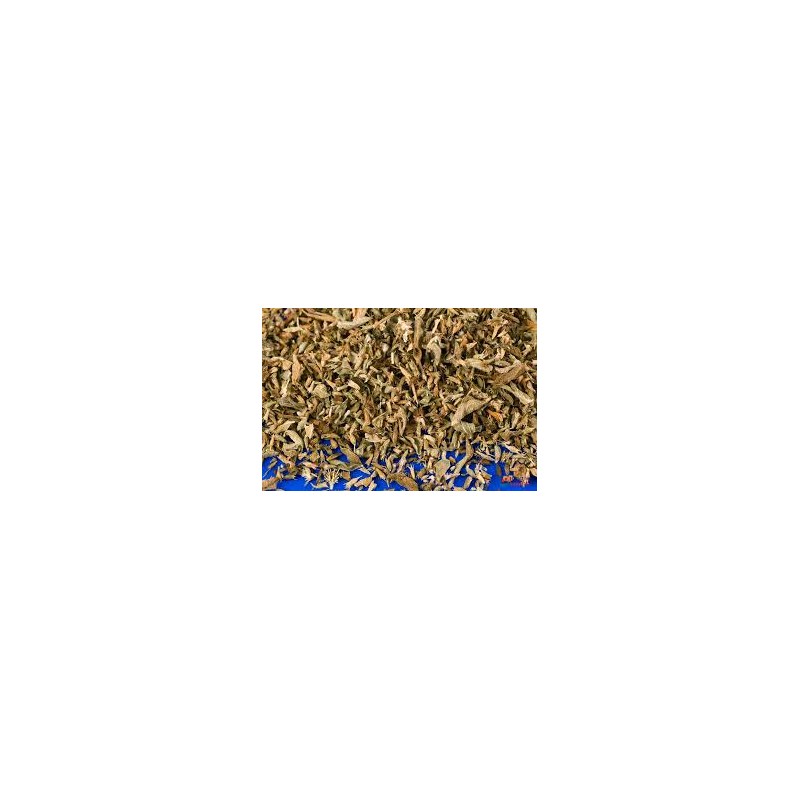
Reference: BRAHMI (Bacopa monnieri)
Banner



Kanna, also known as Sceletium tortuosum, is a unique plant native to southern Africa. For centuries, it has been utilized by the indigenous inhabitants of these regions due to its diverse properties. Kanna contains alkaloids, including mesembrine and mesembrenol, which can impact the nervous system, inducing feelings of relaxation and positive mood. This is particularly valuable during times of heightened stress and tension. Thanks to its adaptogenic properties, Sceletium tortuosum may assist in coping with stress, fatigue, and anxiety. This herb can also influence serotonin levels, a neurotransmitter responsible for mood regulation. As a result, kanna may help alleviate symptoms of depression and enhance overall well-being. Additionally, kanna may support concentration and learning ability, making it an excellent aid during periods of intense study or intellectual work. It is worth mentioning its potential to increase energy levels, which can aid in overcoming fatigue and weariness.
 Security policy
Security policy
(edit with the Customer Reassurance module)
 Delivery policy
Delivery policy
(edit with the Customer Reassurance module)
 Return policy
Return policy
(edit with the Customer Reassurance module)
 OTHER NAMES FOR KANNA
OTHER NAMES FOR KANNA
 1. What is Kanna and what are its properties ?
1. What is Kanna and what are its properties ?
Kanna is a plant from southern Africa, also known as Sceletium tortuosum. For centuries, it has been used by various tribes as a stimulant, relaxant, and remedy for headaches, digestive issues, and depressive states. This plant contains several active substances, such as alkaloids mesembrine, mesembrenol, and tortuosamine, which act on the nervous system. Kanna exhibits stimulating properties, increasing energy levels and enhancing mood. It also improves memory, concentration, and reduces stress and anxiety. Additionally, Kanna may act as an aphrodisiac, enhancing libido and sensory perception. Research has shown that Sceletium tortuosum has analgesic, anti-inflammatory, and antibacterial effects, making it suitable for pain relief, reducing inflammation, and fighting infections. Kanna is also used in folk medicine to treat skin conditions like acne, eczema, and psoriasis. Furthermore, Kanna may aid in weight loss by suppressing appetite and boosting metabolism. However, it is essential to note that Sceletium tortuosum may cause side effects such as fatigue, nausea, headaches, and dry mouth. It should not be used by individuals with heart conditions, low blood pressure, pregnant or breastfeeding women. Before using Kanna for therapeutic purposes, it is always advisable to consult a doctor or herbal specialist.
 2. What chemical compounds does Kanna contain and how do they affect the body ?
2. What chemical compounds does Kanna contain and how do they affect the body ?
Kanna, also known as Sceletium tortuosum, is a plant native to South Africa that has been used for medicinal and ceremonial purposes by local tribes for centuries. It contains various chemical compounds, including alkaloids, flavonoids, and mesembrine. Mesembrine is one of the key active substances in Kanna, acting as a selective serotonin reuptake inhibitor. This means that it increases serotonin levels in the brain, which may impact mood regulation, stress, and anxiety levels. Kanna also contains other chemical compounds like mesembryntetrahydroxycetone, mesembrynopyran, mesembranol, and mesembryonic acid. These compounds affect the nervous system and may have antidepressant effects, reduce stress and anxiety, and improve mood. Flavonoids found in Kanna, such as kaempferol and catechins, exhibit potent antioxidant properties, helping to protect cells from the harmful impact of free radicals. Additionally, Kanna contains alkaloids, including mesembrine mentioned before, and mesembrynotoxin, which may influence visual and sensory perception. Despite the potential health benefits of Kanna, its full effects have not been fully researched, and scientific studies are still ongoing. Therefore, before using Sceletium tortuosum, it is recommended to consult with a doctor or herbal specialist to avoid potential adverse side effects.
 3. What are the traditional and modern uses of the herb kanna ?
3. What are the traditional and modern uses of the herb kanna ?
Kanna, also known as Sceletium tortuosum, is a plant from the mesembryanthemum family native to South Africa. For centuries, it has been used by indigenous peoples for various medicinal and cultural purposes. In recent years, its popularity has spread beyond Africa due to its potential health benefits. Traditionally, Sceletium tortuosum has been used as an analgesic, antidepressant, anxiolytic, and appetite stimulant. The plant contains alkaloids such as mesembrine, mesembryanthine, and tortuosamine, which exhibit psychoactive effects. Kanna is also rich in flavonoids, which act as antioxidants and may help protect cells from damage. Nowadays, Sceletium tortuosum is widely used as a dietary supplement and herbal remedy. It is known for its anxiolytic and mood-enhancing effects, as well as its ability to reduce symptoms of depression. Kanna may also help increase energy levels and reduce feelings of fatigue. Moreover, research suggests that Sceletium tortuosum may aid in alleviating symptoms associated with premenstrual tension syndrome (PMS). In contemporary times, Sceletium tortuosum is available in various forms, including powder, capsules, and extracts. It can also be used as an addition to teas or cocktails. However, it is essential to remember that kanna can have psychoactive effects and should be used in moderation, following the recommendations of a specialist. If there are any doubts about its use, consulting a physician is advisable.
 4. What are the side effects of consuming kanna ?
4. What are the side effects of consuming kanna ?
Kanna has a long history of use as a medicinal and psychoactive substance in South Africa. Similar to other psychoactive substances, consuming kanna can have both beneficial and harmful effects. The most common side effects of consuming kanna include nausea, vomiting, and abdominal pain. Some people may also experience diarrhea, dizziness, and headaches. Another side effect is the disturbance of heart rhythm and an increase in blood pressure. This can lead to more severe problems such as heart attack or stroke. It is not recommended to consume Sceletium tortuosum for individuals with mental disorders such as depression, schizophrenia, or bipolar disorder, as it can exacerbate the symptoms of these conditions and other health issues. Consuming kanna can also lead to dependence and affect brain function. In some cases, individuals who regularly use Sceletium tortuosum may experience depression, anxiety, insomnia, and other mental problems. Therefore, before consuming kanna, it is essential to consult a doctor or pharmacist, especially if the person has any health problems or is taking medications.
![]() 5. Can kanna affect my mental health ?
5. Can kanna affect my mental health ?
Kanna, like many other plants with psychoactive properties, can impact mental health. Consumption of kanna can result in mood changes, such as euphoria or relaxation, but also anxiety, disorientation, or disorganized thoughts. Long-term and regular use of kanna can lead to psychological dependence and have negative effects on mental health, such as difficulties with concentration, memory impairment, depression, or anxiety. Individuals with mental disorders like bipolar disorder, schizophrenia, or anxiety disorders should avoid consuming Sceletium tortuosum, as its effects may exacerbate the symptoms of these conditions. It is essential to remember that each person responds to kanna differently, and its impact on mental health may vary depending on age, gender, health status, or other factors. Before starting to consume kanna, it is advisable to consult a doctor or mental health specialist.
 6. Can kanna interact with other medications or supplements ?
6. Can kanna interact with other medications or supplements ?
Kanna may interact with other medications or supplements, so it is important to consult a doctor before starting to supplement with the kanna herb. Some herbs, drugs, or supplements can alter the metabolism of kanna in the body, leading to an increase or decrease in its effectiveness. For example, using Sceletium tortuosum with monoamine oxidase inhibitors (MAOIs) or antidepressant medications can lead to dangerous interactions. Kanna may also affect the efficacy of antiepileptic, analgesic, antidepressant, and other medications. It is also worth noting that Sceletium tortuosum may act synergistically with other psychoactive substances, such as alcohol or marijuana, leading to potentially harmful reactions. Therefore, before starting Sceletium tortuosum supplementation, it is essential to consult a doctor and inform them about all the medications, supplements, and herbs being taken to avoid unwanted interactions and side effects.
 7. What are the recommended doses of kanna ?
7. What are the recommended doses of kanna ?
Kanna herb is used in various forms, from traditional chewing of fresh leaves to advanced extracts and capsules. The recommended doses of kanna depend on the form in which it is consumed, as well as individual needs and tolerance. For traditional chewing of kanna leaves, the recommended dose is about 50-200 mg of fresh leaves. For dried powder or extract, doses range from 50-500 mg. For standardized extract, doses are around 100-300 mg. Dosage also depends on the purpose of using kanna. If the herb is used to alleviate symptoms of depression or anxiety, the recommended dose is 50-200 mg per day. For mood enhancement, doses are around 50-300 mg per day. It is important to always follow dosage recommendations and consult a doctor before starting kanna use, especially if there are any doubts about its safety and effectiveness.
 8. What are the methods of preparation and consumption of kanna ?
8. What are the methods of preparation and consumption of kanna ?
Kanna is traditionally consumed by the people of South Africa, where it grows naturally, for centuries. There are several methods of preparation and consumption of Sceletium tortuosum that are used by both indigenous people and individuals outside of Africa who have discovered its properties. The most common way of consuming kanna is chewing the leaves or roots of the plant, allowing the release of juice containing active chemical compounds. One can also prepare an infusion from dried leaves or roots, which can be drunk as tea. In South Africa, Sceletium tortuosum is also consumed in the form of a paste, which is rubbed between the teeth and taken orally. There is also the option of using kanna extracts in the form of capsules or powder, which are easier to use and allow for more precise dosing. However, it is essential to remember that kanna is a psychoactive plant, and its consumption can affect our mood and mental health. Therefore, before consuming it, it is advisable to consult a doctor or pharmacist, especially if taking any medications or supplements.
![]() 9. Are there any contraindications for consuming kanna, and who should avoid its use ?
9. Are there any contraindications for consuming kanna, and who should avoid its use ?
Although kanna may have many beneficial uses, there are certain groups of people who should avoid its use. Individuals with heart diseases, hypertension, kidney and liver disorders, as well as pregnant or breastfeeding women, should refrain from consuming kanna. Those who are taking medications for depression, anxiety disorders, or other mental illnesses should also consult their doctor before starting Sceletium tortuosum use, as the chemical compounds in the herb may interact with other medications. Additionally, individuals with a history of addictive tendencies should avoid using kanna, as it may lead to psychological dependency. It is essential for everyone to remember that Sceletium tortuosum should not be used as a substitute for treating diseases or mental disorders.
Before starting Sceletium tortuosum use, it is important to consult a doctor, especially if there are any health issues or if taking any medications. Each person may react differently to the chemical compounds in kanna, so it is crucial to start with smaller doses and observe how the body responds. If any concerning symptoms occur, the use should be discontinued, and a doctor should be consulted.
 SCIENTIFIC RESEARCH
SCIENTIFIC RESEARCH
Kanna, also known as Sceletium tortuosum, is a plant native to South Africa, traditionally used for thousands of years due to its medicinal and psychoactive properties. In recent years, kanna has become the subject of many scientific studies aimed at exploring its components and potential applications.
Among the scientific institutions that have conducted research related to kanna are:
Furthermore, research on kanna is also being conducted in scientific institutions worldwide, including Europe and the USA, where interest in the herb is growing alongside the popularity of natural and alternative therapies.
 STORAGE
STORAGE
To maintain the best quality and freshness of the kanna herb, it should be stored properly. First and foremost, one should avoid exposing it to moisture, sunlight, and temperatures above 25 degrees Celsius, as these factors can affect the herb's quality and shorten its shelf life. The best way to store kanna is by placing it in a tightly closed container made of dark glass or metal that does not allow light to pass through. It can also be stored in paper or aluminum foil bags, but it is best to place them in a container made of dark glass, which will protect the herb from light and moisture. Kanna herb should be stored in a dry and cool place, away from heat sources such as ovens, stoves, or heaters. Properly storing Sceletium tortuosum herb will allow it to maintain its quality, freshness, and effectiveness for a long time.
 SOURCES
SOURCES

Thank you for your interest in our website dedicated to herbs! We are glad that you appreciate our work and effort in creating valuable content. If you would like to share our information on your website, we encourage you to do so. However, please respect our copyrights and do not copy content without our permission.
If you wish to share our website, you can always provide a link that leads to our page. Not only will this help maintain the integrity of our work, but it will also allow your readers to discover more valuable information about herbs.
Thank you for your understanding and support! If you have any questions or need additional information, feel free to contact us.
Reference: BRAHMI (Bacopa monnieri)
Reference: St. John's wort (Hypericum perforatum)
Reference: Smilax officinalis
Reference: siberian ginseng
Reference: red sage
Reference: rhodiola
Reference: Jiaogulan
Reference: 5-hydroksytryptofan / 5 HTP
Your review appreciation cannot be sent
Report comment
Report sent
Your report cannot be sent
Write your review
Review sent
Your review cannot be sent

Kanna, also known as Sceletium tortuosum, is a unique plant native to southern Africa. For centuries, it has been utilized by the indigenous inhabitants of these regions due to its diverse properties. Kanna contains alkaloids, including mesembrine and mesembrenol, which can impact the nervous system, inducing feelings of relaxation and positive mood. This is particularly valuable during times of heightened stress and tension. Thanks to its adaptogenic properties, Sceletium tortuosum may assist in coping with stress, fatigue, and anxiety. This herb can also influence serotonin levels, a neurotransmitter responsible for mood regulation. As a result, kanna may help alleviate symptoms of depression and enhance overall well-being. Additionally, kanna may support concentration and learning ability, making it an excellent aid during periods of intense study or intellectual work. It is worth mentioning its potential to increase energy levels, which can aid in overcoming fatigue and weariness.